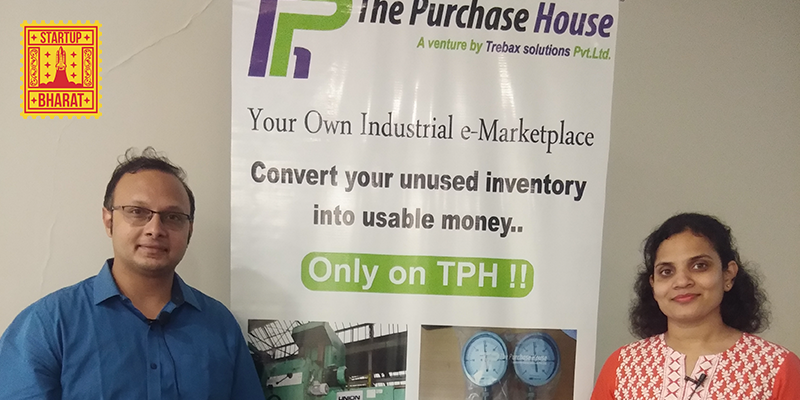The Purchase House is a bootstrapped B2B e-marketplace bringing together sellers and buyers of excess and unused industrial product inventory.
Six years ago, Rushikesh Bhandari and Kanchan Bhandari were providing industries customised procurement solutions, saving organisations the hassle of coordinating with multiple vendors, figuring out logistics, and negotiating costs.
But what irked the husband-wife duo during the process was seeing all the pile-up of excess and unused inventory. This consistent observation led them to start up with The Purchase House in 2017.
“Owing to unpredictability in the industrial sector and general slowdown in the market, we were left with a stock of untouched, high-quality inventory that blocked our huge capital and disturbed the cash flow,” says Rushikesh, 33.
The Purchase House is an industrial e-marketplace for excess and unused inventory, connecting buyers and sellers of excess inventory in an efficient and automated environment.
“Identifying with a problem that many industries with surplus stock have to be facing, the brightest idea came at a rather bleak time, when we decided to risk taking this idea to an online platform, revolutionising it with changing times, and making buying and reselling more accessible and convenient for all industries,” Rushikesh adds.
Based in Nashik, the startup is bootstrapped with the founders’ personal savings of Rs 20 lakh.

Building the portal
The startup achieved a milestone of listing 100 crore industrial products in the past two years. The onboarding process is simple: sellers of excess inventory need to register on the platform, select the listing type, get an easy-to-use dashboard, choose the plan that suits them best, make the payment, and start listing the products. The Purchase House platform will facilitate their contact with buyer leads. Sellers can accept the best offer and close the transaction.
The buyers, on the other hand, can register themselves, browse through all the options available on the portal, contact sellers directly and close the deal on mutually-decided-upon terms. There are no middlemen in the whole process.
The Purchase House also provides value-added services like coordinating logistics and placement during the transaction process with the consent of buyer and seller.
“Our portal is completely free for buyers to use. We charge a 0.2 percent commission on the product value according to the listing. If the seller wants us to coordinate everything on their behalf, then we come into the picture and charge 1.8 percent after sale,” says Rushikesh.
The challenges
The Purchase House has managed to get on board clients like Bosch, Mahindra CIE, ACG Global, Reliable Autotech, Technoshell Pvt Ltd, SMP Electricals, and Sterling Industries as sellers. However, the initial days were not without challenges.
Rushikesh explains that SMEs and MNCs were used to working in the conventional manner of disposing of excess inventory and it was a big challenge to convince them to take the process online.
“Our direct customers are decision-makers of a company so reaching out to them and getting approvals from them was a big task but with determination, we managed to succeed building our credibility and bringing them online,” he notes.
Rushikesh is the COO of The Purchase House, while Kanchan, 30, is the CEO. The others in the team include Vivek Jain, who has worked in Infosys before, and is now CTO of The Purchase House; Naman Maheshwari, who has been with Ernst & Young earlier; and Darshak Shah, who is the Chief Data Scientist at The Purchase House.
The market and revenue
There are B2B ecommerce portals like Indiamart and TradeIndia that list the profile of the sellers on their portal and provide them active leads for material purchase requirements. The Purchase House believes their direct competitors are machine and scrap dealers who are mostly into stock and sale.
“We started with the listing of 25 SKUs in the first month; now we have 4,000 industrial products worth Rs 130 crore listed, have sold products worth Rs 31 crore, and have served over 3,000 SMEs. The team pegs the customer acquisition cost (CAC) at Rs 1,685, and margins are at 70 percent with a lifetime value (LTV) of Rs 4,580.”
Speaking of their future plans, Rushikesh says that they are looking at data analysis and the use of AI for simplifying the procurement processes.
He adds that based on scores of relevant data sources, consumer trends and algorithms, The Purchase House can provide a broader, holistic, and realistic understanding of the market to the manufacturing industries, curbing wasteful production at source, enabling industries to alter their production trends and channelise resources towards products in demand in the market.
“The startup is constantly looking out for the best opportunities for sellers who register on the portal, so when there is a requirement for equipment in the market that the seller may be unaware of, they’re given a gentle nudge to bring it to their notice with the help of efficient algorithms,” says Rushikesh.

